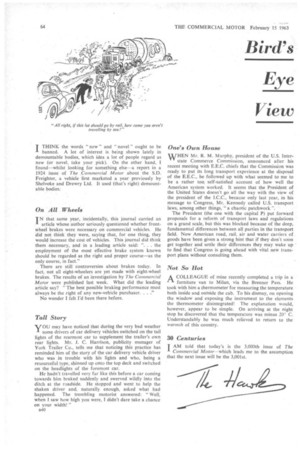Bird's Eye View
Page 66

If you've noticed an error in this article please click here to report it so we can fix it.
T THINK the words " new " and " novel " ought to be -Ibanned. A lot of interest is being shown lately in demountable bodies, which idea a lot of people regard as new (or novel, take your pick). On the other hand, I found—whilst looking for something else—a report in a 1924 issue of The Commercial Motor about the S.D. Freighter, a vehicle first marketed a year previously by SheIvoke and Drewry Ltd. It used (that's right) demountable bodies.
On All Wheels
JN that same year, incidentally, this journal carried an article whose author seriously questioned whether frontwheel brakes were necessary on commercial vehicles. He did not think they were, saying that, for one thing, they would increase the cost of vehicles. This journal did think them necessary, and in a leading article said: ". . . the employment of the most effective brake system known should be regarded as the right and proper course—as the only course, in fact."
There are still controversies about brakes today. In fact, not all eight-wheelers are yet made with eight-wheel brakes. The results of an investigation by The Commercial Motor were published last week. What did the leading article say? "The best possible braking performance must always be the right of any new-vehicle purchaser. . . ."
No wonder I felt I'd been there before.
Tall Story
vOU may have noticed that during the very bad weather some drivers of car delivery vehicles switched on the tail lights of the rearmost car to supplement the trailer's own rear lights. Mr. J. C. Harrison, publicity manager of York Trailer Co., tells me that noticing this practice has reminded him of the story of the car delivery vehicle driver who was in trouble with his lights and who, being a resourceful type, shinned up onto the top deck and switched on the headlights of the foremost car.
He hadn't travelled very far like this before a car coming towards him braked suddenly and swerved wildly into the ditch at the roadside. He stopped and went to help the shaken driver and, naturally enough, asked what had happened. The trembling motorist answered: "Well, when I saw how high you were, I didn't dare take a chance on your width'" B40
One's Own House
HEN Mr. R. M. Murphy, president of the U.S. Inter
state Commerce Commission, announced after his recent meeting with E.E.C. chiefs that the Commission was ready to put its long transport experience at the disposal of the E.E.C., he followed up with what seemed to me to be a rather too, self-satisfied account of how well the American system worked. It seems that the President of the United States doesn't go all the way with the view of the president of the I.C.C., because only last year, in his message to Congress, Mr. Kennedy called U.S. transport laws, among other things,-" a chaotic patchwork ".
The President (the one with the capital P) put forward proposals for a reform of transport laws and regulations on a grand scale, but this was blocked because of the deep, fundamental differences between all parties in the transport field. Now American road, rail, air and water carriers of goods have been given a strong hint that if they don't soon get together and settle their differences they may wake up to find that Congress is going ahead with vital new transport plans without consulting them.
Not So Hot
A COLLEAGUE of mine recently completed a trip in a
'• furniture van to Milan, via the Brenner Pass. He took with him a thermometer for measuring the temperature both inside and outside the cab. To his dismay, on opening the window and exposing the instrument to the elements the thermometer disintegrated! The explanation would, however, appear to be simple. On arriving at the night stop he discovered that the temperature was minus 20 C. Understandably he was much relieved to return to the warmth of this country.
30 Centuries
AM told that today's is the 3,000th issue of The Commercial Motor—which leads me to the assumption that the next issue will be the 3,001st.












































































































